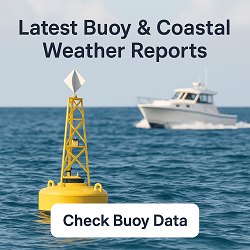Bryan County, OK Weather Forecast and Current Conditions
Current Conditions From Nearby Station Switch to Metric Units

Feels Like 27°F
at
Current Conditions From Nearby Station Switch to Metric Units

Feels Like 27°F
at
Point Forecast at a Glance







7-Day Temperature Trend
Week Ahead Summary
High temperatures climb from 53°F to a high of 81°F by week's end. Some rain possible with at least 2 days showing precipitation chances of 20% or higher.
Climate Context
This week's forecast shows temperatures running 7°F above the historical average for November. Normal highs for this period are around 64°F with lows around 41°F.
This Date in Weather History
1988 - Strong winds circulating around a deep low pressure system in southeastern Ontario buffeted the northeastern U.S., with the Lower Great Lakes Region hardest hit. Winds in western New York State gusted to 68 mph at Buffalo, to 69 mph at Niagra Falls, and to 78 mph at Brockport. Four persons were injured at Rome NY when a tree was blown onto their car.
More on this and other weather history
Bryan County, OK 7 Day Weather Forecast Details
Monday Nov 10

Day: Sunny, with a high near 53. North northwest wind 2 to 8 mph.

Night: Clear, with a low around 36. South southeast wind 1 to 10 mph.
Tuesday Nov 11

Day: Sunny, with a high near 68. South southwest wind 10 to 18 mph, with gusts as high as 28 mph.

Night: Mostly clear, with a low around 47. South wind 6 to 13 mph, with gusts as high as 20 mph.
Wednesday Nov 12

Day: Sunny, with a high near 75.

Night: Mostly clear, with a low around 54.
Thursday Nov 13

Day: Sunny, with a high near 81.

Night: Mostly clear, with a low around 61.
Friday Nov 14

Day: Mostly sunny, with a high near 81.

Night: Partly cloudy, with a low around 63.
Saturday Nov 15

Day: A chance of rain showers before noon, then a chance of showers and thunderstorms. Mostly cloudy, with a high near 76. Chance of precipitation is 50%.

Night: A chance of rain showers. Mostly cloudy, with a low around 51. Chance of precipitation is 40%.
Sunday Nov 16

Day: A chance of rain showers. Mostly sunny, with a high near 66.
Sun & Moon Monthly
Sunrise 6:54 AM
Sunset 5:26 PM
Last Light 5:52 PM
Moonset 12:26 PM

Contiguous United States Extremes
Sun's High Temperature
97 at Corona, CA and Indio, CA
Sun's Low Temperature
-4 at Tioga, ND
Weather Folklore
When ropes are tight it's going to rain; When weather's fair, they're slack again.

Current subscribers - login to your ClearSky account
About Bryan County, OK
Content from Wikipedia, licensed under CC BY-SA 3.0.
How We Provide Better Local Weather
Current conditions: We use the nearest available station to your location - including professional MESONET/MADIS and local weather stations - often miles closer than regional airports.
Forecasts: National Weather Service point forecasts predict for your specific area, not broad regional zones, making them far more relevant to your location.

